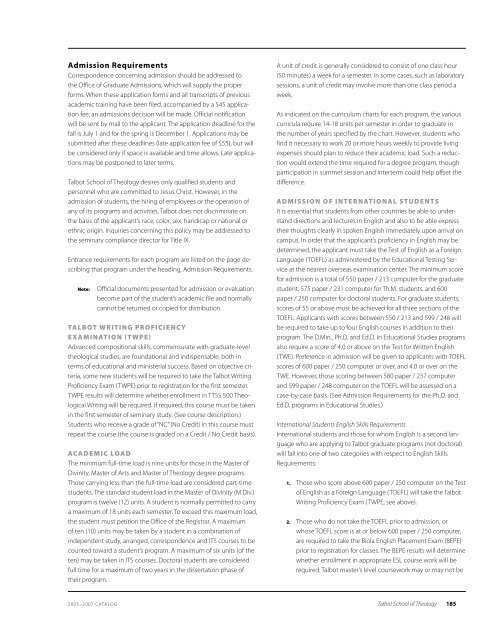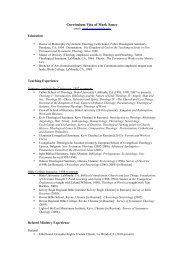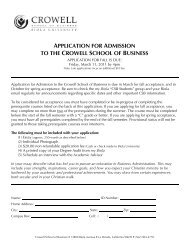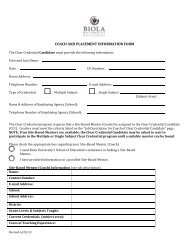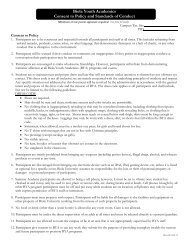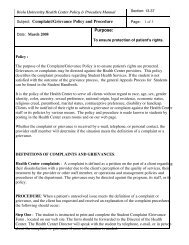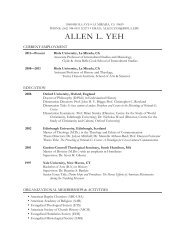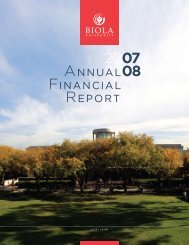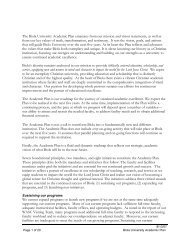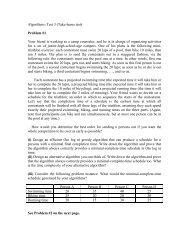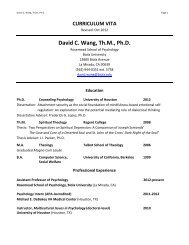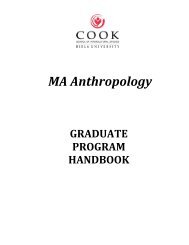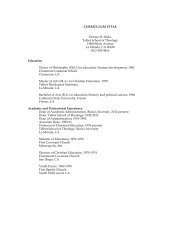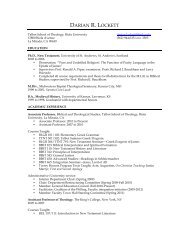You also want an ePaper? Increase the reach of your titles
YUMPU automatically turns print PDFs into web optimized ePapers that Google loves.
Admission Requirements<br />
Correspondence concerning admission should be addressed to<br />
the Office of Graduate Admissions, which will supply the proper<br />
forms. When these application forms and all transcripts of previous<br />
academic training have been filed, accompanied by a $45 application<br />
fee, an admissions decision will be made. Official notification<br />
will be sent by mail to the applicant. The application deadline for the<br />
fall is July 1 and for the spring is December 1. Applications may be<br />
submitted after these deadlines (late application fee of $55), but will<br />
be considered only if space is available and time allows. Late applications<br />
may be postponed to later terms.<br />
Talbot School of Theology desires only qualified students and<br />
personnel who are committed to Jesus Christ. However, in the<br />
admission of students, the hiring of employees or the operation of<br />
any of its programs and activities, Talbot does not discriminate on<br />
the basis of the applicant’s race, color, sex, handicap or national or<br />
ethnic origin. Inquiries concerning this policy may be addressed to<br />
the seminary compliance director for Title IX.<br />
Entrance requirements for each program are listed on the page describing<br />
that program under the heading, Admission Requirements.<br />
note: Official documents presented for admission or evaluation<br />
become part of the student’s academic file and normally<br />
cannot be returned or copied for distribution.<br />
ta l b o t W r I t I n G P r o f I C I e n C y<br />
e x a m I n at I o n ( t W P e )<br />
Advanced compositional skills, commensurate with graduate-level<br />
theological studies, are foundational and indispensable, both in<br />
terms of educational and ministerial success. Based on objective criteria,<br />
some new students will be required to take the Talbot Writing<br />
Proficiency Exam (TWPE) prior to registration for the first semester.<br />
TWPE results will determine whether enrollment in TTSS 500 Theological<br />
Writing will be required. If required, this course must be taken<br />
in the first semester of seminary study. (See course description.)<br />
Students who receive a grade of “NC” (No Credit) in this course must<br />
repeat the course (the course is graded on a Credit / No Credit basis).<br />
aC a d e m I C l oa d<br />
The minimum full-time load is nine units for those in the Master of<br />
Divinity, Master of Arts and Master of Theology degree programs.<br />
Those carrying less than the full-time load are considered part-time<br />
students. The standard student load in the Master of Divinity (M.Div.)<br />
program is twelve (12) units. A student is normally permitted to carry<br />
a maximum of 18 units each semester. To exceed this maximum load,<br />
the student must petition the Office of the Registrar. A maximum<br />
of ten (10) units may be taken by a student in a combination of<br />
independent study, arranged, correspondence and ITS courses to be<br />
counted toward a student’s program. A maximum of six units (of the<br />
ten) may be taken in ITS courses. Doctoral students are considered<br />
full time for a maximum of two years in the dissertation phase of<br />
their program.<br />
A unit of credit is generally considered to consist of one class hour<br />
(50 minutes) a week for a semester. In some cases, such as laboratory<br />
sessions, a unit of credit may involve more than one class period a<br />
week.<br />
As indicated on the curriculum charts for each program, the various<br />
curricula require 14-18 units per semester in order to graduate in<br />
the number of years specified by the chart. However, students who<br />
find it necessary to work 20 or more hours weekly to provide living<br />
expenses should plan to reduce their academic load. Such a reduction<br />
would extend the time required for a degree program, though<br />
participation in summer session and interterm could help offset the<br />
difference.<br />
a d m I s s I o n o f I n t e r n at I o n a l s t U d e n t s<br />
It is essential that students from other countries be able to understand<br />
directions and lectures in English and also to be able express<br />
their thoughts clearly in spoken English immediately upon arrival on<br />
campus. In order that the applicant’s proficiency in English may be<br />
determined, the applicant must take the Test of English as a Foreign<br />
Language (TOEFL) as administered by the Educational Testing Service<br />
at the nearest overseas examination center. The minimum score<br />
for admission is a total of 550 paper / 213 computer for the graduate<br />
student, 575 paper / 231 computer for Th.M. students, and 600<br />
paper / 250 computer for doctoral students. For graduate students,<br />
scores of 55 or above must be achieved for all three sections of the<br />
TOEFL. Applicants with scores between 550 / 213 and 599 / 248 will<br />
be required to take up to four English courses in addition to their<br />
program. The D.Min., Ph.D. and Ed.D. in Educational Studies programs<br />
also require a score of 4.0 or above on the Test for Written English<br />
(TWE). Preference in admission will be given to applicants with TOEFL<br />
scores of 600 paper / 250 computer or over, and 4.0 or over on the<br />
TWE. However, those scoring between 580 paper / 237 computer<br />
and 599 paper / 248 computer on the TOEFL will be assessed on a<br />
case-by-case basis. (See Admission Requirements for the Ph.D. and<br />
Ed.D. programs in Educational Studies.)<br />
International Students English Skills Requirements<br />
International students and those for whom English is a second language<br />
who are applying to Talbot graduate programs (not doctoral)<br />
will fall into one of two categories with respect to English Skills<br />
Requirements:<br />
1. Those who score above 600 paper / 250 computer on the Test<br />
of English as a Foreign Language (TOEFL) will take the Talbot<br />
Writing Proficiency Exam (TWPE; see above).<br />
2. Those who do not take the TOEFL prior to admission, or<br />
whose TOEFL score is at or below 600 paper / 250 computer,<br />
are required to take the <strong>Biola</strong> English Placement Exam (BEPE)<br />
prior to registration for classes. The BEPE results will determine<br />
whether enrollment in appropriate ESL course work will be<br />
required. Talbot master’s level coursework may or may not be<br />
20<strong>05</strong> – 20<strong>07</strong> C ATA LO G Talbot School of Theology 185


